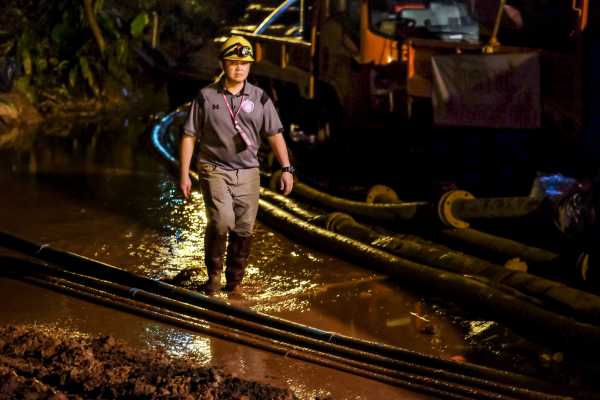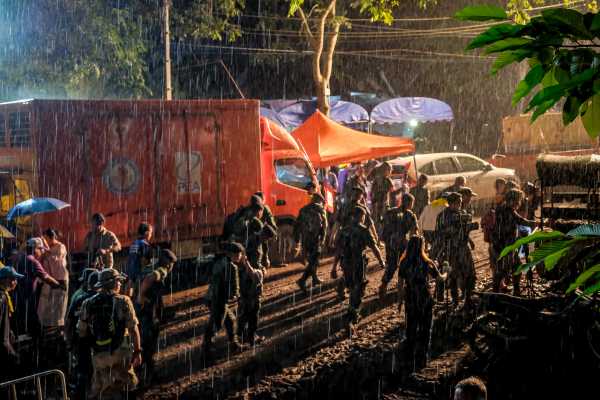
Twelve Thai boys and their soccer coach who’d been missing for nine days were found trapped in a cave a half a mile under the ocean by a team of British divers on Monday night. The world rejoiced.
But as of Thursday, the boys were still stuck in the flooded Tham Luang Nang Non cave system in northern Thailand. And their status remains perilous. There are about 2.5 miles of flooded cave between them and the entrance. While they’re currently on safe ground above the floodwater, more monsoon rains are expected this weekend, and the cave system could be flooded for up to four months.
The mission to rescue them is an extraordinary international operation with hundreds of cave and rescue experts and military personnel from several different countries, including the United States, pitching in. They are helping to bring food and medical assistance to the boys and the coach, and advising the Royal Thai Navy on how best to get them out.
According to several news outlets, there are four different rescue options under consideration: leaving them in the cave until the water recedes, pumping water out so they can walk out the way they came in, teaching the boys to scuba dive so they can undertake the harrowing five-hour underwater journey out of the cave, or drilling into the cave to pull them out.
On Tuesday, Thai Navy SEALs reported that the boys are relatively healthy and excited to see their families. But their fate is still very uncertain and rescuers will have to make huge, difficult decisions soon about how best to keep them safe.
How did the Thai boys get in the cave?
It was Saturday, June 23. The team of 12 boys — who were all between the ages of 11 and 16 and nicknamed the Wild Boars — had just finished a weekly soccer practice and went to explore the cave with their coach. According to the Wall Street Journal, they had been inside the cave before; this time, they wanted to go further in to write their names on the wall as part of an initiation.
But after they’d entered the cave, heavy rain started falling and the rising water trapped them inside the cave.
As Richard C. Paddock and Muktita Suhartono of the New York Times reported, at first, the governor of in Chiang Rai province, where the cave is located, thought a rescue would be “impossible.”
But the effort swiftly became an international collaboration. The US sent 30 people, including 17 members of the Air Force. Rescuers joined from Australia, Japan, China, Myanmar, and Laos. The British Cave Rescue Council headed the cave exploration that eventually found them.
According to the Times, the two civilian divers from England,
When they found the missing boys and the coach, they were huddled on a rock above the water, smiling but emaciated.
Footage of that moment — published on the Thai Navy SEALs’ Facebook page — has 23 million views. Over muffled audio, you can hear one of the rescuers telling the boys, “You have been here 10 days. 10 days. You are very strong, very strong.”
The story struck a happy chord around the world. People from all over tweeted out their excitement upon hearing of the rescue.
How will rescuers get them out of the cave?
The excitement has been short-lived, though, as the boys’ safety remains uncertain and rescuers are weighing how best to retrieve them.
The ideal solution — and the one that the rescuers are working toward — would be to pump out the water flooding the cave so the boys and the coach can simply walk out the way they came in. Over the past four days, the Thai military has been using hundreds of industrial pumps to lower the water level by 40 percent, according to the Guardian. So far this week, the weather has been fairly dry. But now it’s a race against the elements with more rain predicted to fall this weekend.

A second option would be to drill into the cave and pull the boys out from above. But this method would require new roads to accommodate the drilling equipment, as well as better maps and time to figure out where exactly the boys are and how to reach them. This approach doesn’t look very feasible, according to the BBC.
If the water levels do rise, the boys and the coach might have to swim and dive the 2.5 miles to the mouth of the cave, with the help of divers who would guide them out. The New York Times spoke to an experienced cave diver who believes that — even though none of the boys currently know how to swim — this method could work: “It is just the logistical thing of how to get them out, because they have never dived before,” he said. “They will have to learn very quickly.”
The Guardian reports that they have begun learning how to dive, but are still too weak to make it 2.5 miles. It currently takes the experienced divers five hours to make that journey due to high currents, poor visibility, and narrow, muddy paths.
The fourth option? To simply wait out the flooding until they can walk out of the cave. Since the monsoon season ends in October, this could mean up to a four-month wait. Captain Anand Surawan of the Thai Navy said that they have already sent down four months worth of food and are prioritizing the health and safety of the boys before bringing them out.

What happens until they’re rescued?
The rescue effort is being led by the Royal Thai Navy.
The Navy, as well as a Special Response Team from Australia, has been bringing in food, water, medicine, and diving equipment into the cave. They are also trying to fit a fiber optic cable so that the boys can talk to their families, whose excitement has now turned to anxiety.
Soccer stars are providing moral support too: Cristiano Ronaldo and Christian Fuchs have sent messages to the team.
The Navy has been updating the world with videos posted to their Facebook page. On Tuesday a video showed the boys smiling and telling everyone that they were healthy.
They also showed videos of the medical professionals at work, treating minor cuts and scrapes.
Thai Navy SEAL Chief Rear Adm. Aphakorn Yukongkaew told reporters during a press conference on Tuesday: “Now we have given food to the boys, starting with food that is easy to digest and provides high energy. … We have taken care of those boys following the doctor’s recommendation. So do not worry, we will take care of them with our best. We will bring all of them with safety. We are now planning how to do so.”
Sourse: vox.com






